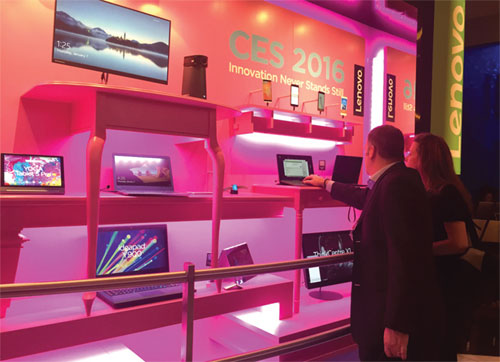Lenovo takes aim beyond just hardware
China's tech giant Lenovo started its new year by introducing nearly 40 new products at the Consumer Electronics Show in Las Vegas. The global personal computer leader is also pushing hard on mobile devices, software and cloud service.
The company unveiled the thinnest ultraportable convertible laptop YOGA 900S, Vibe S1 smartphone with a front-facing camera designed specifically to take great selfies and Ideacentre 610s, a desktop PC that comes with a removable wireless projector. There are also new tablets, monitors and all-in-one PCs.
After the acquisition of Motorola in 2014, Lenovo has been pioneering innovative mobile products. On its show floor in the Venetian hotel, a lady demonstrated dropping the shatterproof smartphone Droid Turbo 2 on the ground. She also dropped a third generation Moto G smartphone into a tank of water. The phone not only did not die, it took pictures underwater.
Asked about Lenovo's vision for mobile devices, Chen Xudong, president of the mobile business group, said, "Phone is everything. Whatever you want your phone to do but it can't do yet is what we are working on."
Gradually shifting from the image of a hardware maker, Lenovo's new goal is to create a relationship with its customers.
"We very much focused on products in the past, and now we are making the customers the center of Lenovo," said CEO Yang Yuanqing at a press conference during CES. "We will provide our customers with a complete solution. Not only the hardware but also software and cloud services. Our solutions will be tailored to the different needs of the customers - some love playing games, some want education."
Lenovo also announced Air Class, a virtual classroom for companies and educators to conduct corporate training or remote education. Once in the application, instructor and students can interact through video, audio, messaging and file transfer.
Two features that stand out are the AirClass Reply and Emotion Insights. When a student misses a class, he or she can still relive the class in real time.
"If you come in from another room and see me taking a class, you won't be able to tell that I, in fact, missed the class," said Salvatore Patalano, chief revenue officer of Stoneware, a software company acquired by Lenovo in 2012.
The Emotion Insights feature help to evaluate an online class. By detecting the students' facial expressions via cameras, the software calculates their attention and engagement level and provides feedback to the instructor, who will also be able to tell when the student is surprised, sad, happy, frustrated, afraid, disgusted, confused, angry or contemptuous.
AirClass is Lenovo's first software that doesn't require its users to have a Lenovo device.
"We are selling a service, a solution regardless of your hardware," Patalano said, calling it a huge step for Lenovo. "Software is what creates stickiness with customers."
"It's all about the connection," said He Zhiqiang, president of Lenovo's Ecosystem and Cloud Services Business Group founded in 2014, with a mission to present ultimate user experience in a "device-plus-services" mode and to explore new Internet businesses for Lenovo's Internet transition.
Though a young division, it's an essential player in the future of Lenovo, according to the executives. Monthly active users of the cloud reached 100 million in mid-2015.
"Now by pressing only one button, our customer will be able to provide us with feedback on their products," said He. "Whereas in the past, customers had to fill out forms, and sometimes it took weeks before they get to us."
The group admitted that it's not easy for a hardware-focused company to expand toward software and clouds. "We are trying very hard to let people know that Lenovo is more than hardware," said Wes Williams, executive director of marketing and operations.
hezijiang@chinadailyusa.com
|
A?customer checks out a new Lenovo tablet at the Consumer Electromics Show in Las Vegas on Thursday. |

























